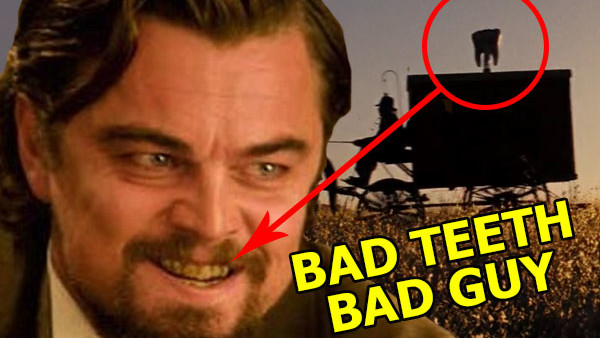Film Theory: Django Unchained Is About A Dentist Fighting Sugar
Nothing ruins your teeth like infections...

Looking for reasons behind some of Quentin Tarantino's more quirky creative decisions is often pointless. He's a provocative artist who will do what he likes for effect, whether that's caving Hitler's head in, dropping N-word bombs everywhere or refusing to answer what's in the briefcase. And there's something to be said about that sort of confidence.
But Tarantino's films are also artfully constructed celebrations of decades of film history and the theory of film-making. They may be far more pop culture targeted than their inspiration points, but they prove beyond any question that Tarantino puts his entire brain into his film-making, even when it's all violence and swearing and Big Kahuna Burgers.
That also means that digging at his films can be incredibly revealing. And sometimes, Tarantino doesn't even bury those revelations particularly deep, which is definitely the case with his first Western.
Because, it might sound obvious, but Tarantino's hyper-violent Django Unchained is actually all about a dentist fighting sugar.
Think about it: Django's partner in crime-fighting is Christoph Waltz's Dr King Schultz, a bounty hunter who travels the States finding wanted men in a carriage with a giant tooth on top. On the surface that just appears to be a Tarantino quirk - a cute little weird eccentricity that is accepted entirely in his film universe while we in the real world laugh at the oddity.
On a second level, it works for Schultz because it gives him an opportunity to hide in plain sight from his targets. Who - after all - would suspect that a dentist was about to kill them for the bounty on their head?
But on the most important level, it means the dentist has a very literal battle with sugar. Well, two battles, to be a little more specific.
When we first meet him, he's hunting the Brittle Brothers. It's no accident that the violent slave owners share their name with a peanut brittle company or that they generally inspire thoughts of that sweet, teeth-decaying treat. They're simply the first wave of Schultz's assault on tooth decay.
After that, of course, the real villain of the piece turns up: Leonardo DiCaprio's terrifying, brilliant Calvin Candie, proprietor of the arrogantly named Candyland, a den of moral repugnance, inhuman violence against slaves and an assumed air of superiority that is its sickliest poison.
In the end, though he is taken down himself, Schultz's actions - which are driven by the intoxicating compulsion to strike back at Candie when his despicable behaviour and affectations become too much to take - bring down Candyland and its rotten heart. The dentist, in effect, deals with the infection in the most devastating way.
But there's more to it than that. This is not merely a clever little gag by Tarantino for the sake of raising a few smiles. Schultz is no mere doctor and the infection he fights is an entirely different one to simple cavities and tooth-ache. He turns the tools of his trade to taking on the infection of slavery.
Calvin Candie is the living embodiment of the infection. He is effectively the tooth infection that Schultz must eradicate to stop the spread. He is the rotten tooth to be extracted. And if you want any further proof, just look at his teeth.
Candie prides himself on his immaculate demeanour and affects airs and graces by drinking cocktails he imagines to be the height of culture and surrounding himself with opulence and grandeur that is so over the top it's vulgar. This charlatan presents himself as the pinnacle of human evolution: he's rich, he's powerful and he has dominion over creatures he believes to be lower than himself. He even has supposed science to back up his delusions of superiority.
He is infected to the very root and his teeth give away his true nature. They're yellowed and obviously in severe decay (thanks in part to his affection for sugary cocktails), revealing his delusions for what they truly are - vain masks worn to cover fundamental rottenness.
Schultz might not be there to extract him the same way he was the Brittle Brothers, but on the discovery of the infection, he does what any good dentist would. He removes the source. He kills the infection dead.
For Tarantino, candy and tooth decay are allegorical pointers for the epidemic of slavery in the South, Calvin Candie and the Brittle Brothers are the destructive influence spreading the infection through the sugar of their racism and the rise in power of Django is the purest indication of the removal of that infection. Django isn't just there to continue the good work of his dentist forebear: he is good oral health personified. As long as he endures, racism and slavery cannot win.